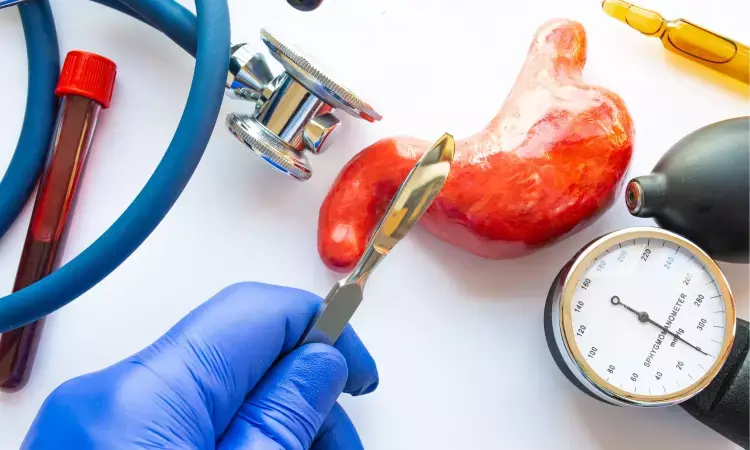- Home
- Medical news & Guidelines
- Anesthesiology
- Cardiology and CTVS
- Critical Care
- Dentistry
- Dermatology
- Diabetes and Endocrinology
- ENT
- Gastroenterology
- Medicine
- Nephrology
- Neurology
- Obstretics-Gynaecology
- Oncology
- Ophthalmology
- Orthopaedics
- Pediatrics-Neonatology
- Psychiatry
- Pulmonology
- Radiology
- Surgery
- Urology
- Laboratory Medicine
- Diet
- Nursing
- Paramedical
- Physiotherapy
- Health news
- Fact Check
- Bone Health Fact Check
- Brain Health Fact Check
- Cancer Related Fact Check
- Child Care Fact Check
- Dental and oral health fact check
- Diabetes and metabolic health fact check
- Diet and Nutrition Fact Check
- Eye and ENT Care Fact Check
- Fitness fact check
- Gut health fact check
- Heart health fact check
- Kidney health fact check
- Medical education fact check
- Men's health fact check
- Respiratory fact check
- Skin and hair care fact check
- Vaccine and Immunization fact check
- Women's health fact check
- AYUSH
- State News
- Andaman and Nicobar Islands
- Andhra Pradesh
- Arunachal Pradesh
- Assam
- Bihar
- Chandigarh
- Chattisgarh
- Dadra and Nagar Haveli
- Daman and Diu
- Delhi
- Goa
- Gujarat
- Haryana
- Himachal Pradesh
- Jammu & Kashmir
- Jharkhand
- Karnataka
- Kerala
- Ladakh
- Lakshadweep
- Madhya Pradesh
- Maharashtra
- Manipur
- Meghalaya
- Mizoram
- Nagaland
- Odisha
- Puducherry
- Punjab
- Rajasthan
- Sikkim
- Tamil Nadu
- Telangana
- Tripura
- Uttar Pradesh
- Uttrakhand
- West Bengal
- Medical Education
- Industry
Bariatric surgery may offer beneficial cardiac effects in non-HFpEF patients with obesity

Recently, there has been mounting clinical evidence supporting the metabolic and weight-loss benefits of bariatric surgery for obese patients, which leads to improved cardiac structure. However, its effectiveness in enhancing the cardiac function of heart failure patients remains controversial.
A recent study published in Obesity Surgery found bariatric surgery to have beneficial cardiac effects on non-HFpEF (heart failure and preserved ejection fraction) obese patients. However, it did not substantially improve the pooled analysis of cardiac parameters. The extent of improvement may be influenced by factors such as the patient's baseline age and BMI and BMI loss extent. Shi-jing Lu et al. led the study.
This meta-analysis assessed BS's effect on cardiac function by examining LVEF (left ventricular ejection fraction) and NYHA (New York Heart Association) changes in non-HFpEF patients post-surgery.
Articles were sourced from PubMed and Embase, starting from their inception to December 9, 2022, using the Minors scale to evaluate their quality. The study included patients with non-HFpEF and severe obesity, requiring pre-operative and post-operative values of LVEF or NYHA to be reported.
Important points of consideration from the study include:
· Nine studies (146 patients) were included, with a final result showing improved cardiac functional parameters in non-HFpEF patients.
· Following the mean follow-up time of 15.8 months, the mean NYHA decreased by 0.59, and the mean LVEF increased by 7.49%.
In conclusion, bariatric surgery is associated with improved cardiac parameters in patients with non-HFpEF (heart failure and preserved ejection fraction). The extent of BS on cardiac functional improvement may relate to baseline BMI, age, and extent of BMI loss.
Bariatric surgery positively influences the cardiac function of non-HFpEF patients with obesity, they said.
PhD research initiation program of Liaoning Province, 2022-BS-358, funded the study.
Reference:
Lu, Sj et al. Evidence of Bariatric Surgery Benefits Cardiac Function in Non-HFpEF Patients with Obesity: a Meta-Analysis. OBES SURG 33, 3353–3361 (2023). https://doi.org/10.1007/s11695-023-06670-8
BDS, MDS in Periodontics and Implantology
Dr. Aditi Yadav is a BDS, MDS in Periodontics and Implantology. She has a clinical experience of 5 years as a laser dental surgeon. She also has a Diploma in clinical research and pharmacovigilance and is a Certified data scientist. She is currently working as a content developer in e-health services. Dr. Yadav has a keen interest in Medical Journalism and is actively involved in Medical Research writing.
Dr Kamal Kant Kohli-MBBS, DTCD- a chest specialist with more than 30 years of practice and a flair for writing clinical articles, Dr Kamal Kant Kohli joined Medical Dialogues as a Chief Editor of Medical News. Besides writing articles, as an editor, he proofreads and verifies all the medical content published on Medical Dialogues including those coming from journals, studies,medical conferences,guidelines etc. Email: drkohli@medicaldialogues.in. Contact no. 011-43720751


